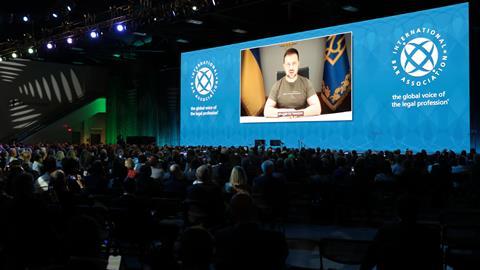In a video address to the International Bar Association, Ukraine president calls on lawyers to bring to justice ‘those guilty of terror’ and declares ‘this is a chance to establish the force of international law’
Ukraine president Volodymyr Zelensky told the global legal profession this week that lawyers can play a crucial role in ending his country’s war. Addressing the International Bar Association conference in Miami by video link, Zelensky said the law can bring closure to the conflict once fighting ends.
Every war crime committed by Russian forces will be investigated and perpetrators brought to justice, he said. ‘I would like to draw attention to the fact that lawyers will put an end to this war after the military, after the politicians,’ said the president. ‘Lawyers will ensure that all those guilty of terror are brought to justice and that all damages caused by Russia are compensated at the expense of the assets of the aggressor state itself. It is this kind of justice that should be the end of the evil that Russia has brought.’
Millions of people have been displaced and several cities devastated by missile and bomb attacks following Russia’s invasion in February.
Zelensky said Ukraine is already cooperating with law enforcement in the US and the International Criminal Court to bring to account anyone who has committed war crimes. The country has also created the Special Compensation Mechanism, which will ensure the confiscation and channelling of Russian assets to compensate for losses caused by the war.
‘This is a chance for all of us to establish the force of international law,’ added Zelensky.
A separate IBA event on how to rebuild Ukraine heard that international law-enforcers are now dealing with more than 30,000 incidents of alleged war crimes which have been documented and recorded.
International criminal law expert Mark Ellis, IBA executive director, said there was an unprecedented focus on accountability for what is happening in Ukraine. But he said legitimate concerns remain about how cases can be prosecuted, particularly on whether the international community is in agreement on how and whether to prosecute certain individuals.
Ellis downplayed expectations that the International Criminal Court would play a central role in prosecutions, suggesting instead that most cases should be heard in Ukraine itself.
Elsewhere, the conference heard that a more nuanced method than setting quotas can be found for ensuring women are represented at the top of law firms.
Christina Blacklaws, a former Law Society president, suggested that firms adopt the approach of ensuring they match the proportion of female associates with the same proportion at senior level.
This would eliminate the need for arbitrary quotas and prove that firms are addressing the pipeline of talent coming through, rather than seeking to tick boxes.
Blacklaws said that if 60% or 70% of law firms are made up of female associates then firms should seek to ensure that senior equity partners have a similar profile. If those firms are still dominated by male leaders, then quotas would not address the central issue of women at partner level leaving the business.
Blacklaws added: ‘Transparency is absolutely key to this and lack of transparency around this issue is problematic. We have gender pay reporting which has put a real spotlight on law firms [and can be extended].’
Addressing the issue of female talent leaving firms, she called for greater use of talent development programmes, sponsorship and mentoring, and for all lawyers to be trained to support each other.
‘These are all things that are relatively easy which can make a huge impact on the culture, purpose and sense of belonging in law firms,’ added Blacklaws.
The conference heard that in the US alone, 8,000 female partners are believed to have left the profession in the past two years. A huge disparity remains between the number of women entering the profession and those who have reached equity-partner level.
Research carried out by the American Bar Association found a significant disconnect between law firm bosses and their female staff about how well the business is doing at promoting gender equality.
One survey found that 91% of firm leaders rated themselves as active advocates of diversity, whereas only 62% of women in the same practices agreed. More than 80% of leaders thought they were successful at promoting women leaders, compared with 55% of women who felt the same.
The conference heard that progress has been made since the pandemic in terms of staff being given more flexibility about where and when they work – a factor likely to benefit women with caring responsibilities – but concerns were voiced that firms are increasingly demanding that staff come into the office full-time.
































No comments yet